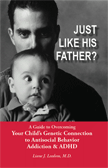 Many of you who have been with a sociopath have had children with him/her. I’ve heard a lot of sad and horrible stories from partners who are left with the fall-out of the damage done to the children. The sociopath can be abusive, parentify the child into meeting his/her needs, or ally the child against the other parent, all of which are extremely damaging. The child may also be exposed to chaos in the home, addiction, or divorce.
Many of you who have been with a sociopath have had children with him/her. I’ve heard a lot of sad and horrible stories from partners who are left with the fall-out of the damage done to the children. The sociopath can be abusive, parentify the child into meeting his/her needs, or ally the child against the other parent, all of which are extremely damaging. The child may also be exposed to chaos in the home, addiction, or divorce.
If this weren’t bad enough, the child of a sociopath will have half of his/her genes, making the child vulnerable to developing sociopath traits. That is why Dr. Liane J. Leedom’s book, Just Like His Father? is timely and of crucial importance. She is not only a psychiatrist who has done research on the genetic traits associated with sociopathy, she is the single mother of a child whose father is one. Dr. Leedom has discovered how to override those biological vulnerabilities to prevent them from evolving into sociopathy.
Dr. Leedom relates clearly and simply the research on the inherited traits that may be showing up in the child that make the child “at risk”. Then she offers specific behavioral strategies to apply that develop what she calls the “Inner Triangle” of good character: (overcoming) impulsivity, moral reasoning, and the ability to love. She exhorts the importance of devoting yourself to the relationship with your child as a protective shield, as well as the importance of involving family and community to reinforce the work you are doing. She demonstrates how the effort can pay off to produce a well-adjusted child with good character, as opposed to a child in which the “at risk” traits will cause struggle and permanently interfere with emotional and social growth.
 As a therapist I have worked with many children who have at risk traits and their parents. I believe that Dr. Leedom has nailed the issues and the most effective ways to address them, and she backs it up with the science.
As a therapist I have worked with many children who have at risk traits and their parents. I believe that Dr. Leedom has nailed the issues and the most effective ways to address them, and she backs it up with the science.
As I read her words, I felt the sense of her maternal intuition that brought together the science and the parenting strategies, and of the love with which she has executed it. Not only are her methods effective in helping the at risk child, this is the best book on parenting in general I have ever come across. I will even call it brilliant. Dr. Leedom offers incredible hope for parents struggling with the difficulty of raising an “at risk” child. If you are raising such a child, or any child, you owe it to yourself, your child, and society to read this book.
Just Like His Father? is available in the Lovefraud Store.




































Donna Andersen
To Lovefraud readers: We had a technical glitch yesterday and some comments were lost. My webmaster is stumped. If you see that your comments have disappeared, I hope you will repost them. I’m very sorry for the inconvenience.
Donna Andersen
Well we figured out the glitch – someone was maliciously deleting comments. The vulnerability that allowed the tampering is corrected.
jm_short
I can only wish that Dr. Leedom’s book had been published as I raised my son, who resulted from my relationship with a psychopath. While it’s impossible for me to turn the clock back, I can see how Dr. Leedom’s methods would have made a significant difference in his moral development.
As a child, my son was adorable, but with issues that no therapist, and there were many, ever concluded were the result of his genetics. As he aged and got kicked out of one school after another, every professional I sought help from tried to put a band aid on his impulsivity, ADHD, and opositional/defiance rather than dealing with the problem at its core; he lacked effective empathy.
Although I can’t change the consequences for my son who is now in his thirties, Dr. Leedom’s book at least enabled me to understand what went wrong and take a measure of peace from it.
What a wonderful book!
JmS
flicka
I agree that a “normal” parent’s influence on her children’s eventual character is crucial, I find that later in theie lives, these children of psychotics, often develop the psychotic traits as a result of our current soociety’s veneration of “success” and monetary values. Dr. Hare discusses this phenomena in his book “Snakes in Suits” but I think he fails to include politicians, “stars”, athletes, judges, economists in his corporate influences. Psychotics exist in all positions of power, not just the corporate world. Today’s society seems to glorify all the inherrent qualities found in psychopaths and this has caused a lapse in our general morality and compassion.